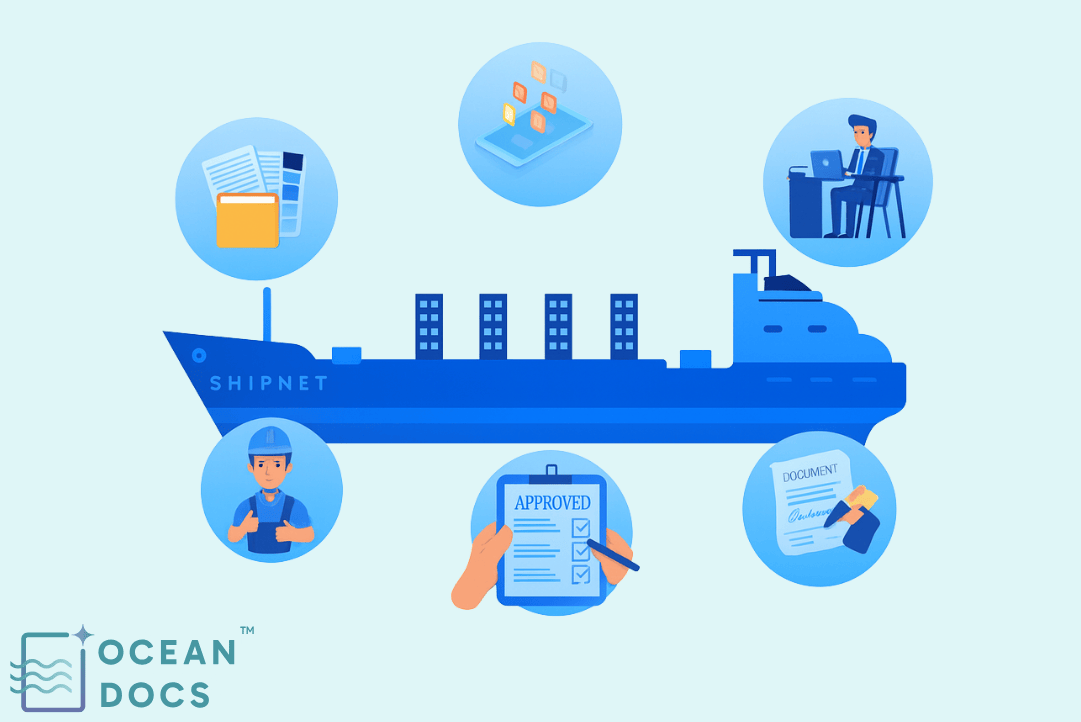
How AI Is Transforming Maritime Documentation and Compliance
October 9, 2025 By OceanDocs AI
Maritime operations today involve far more than moving cargo between ports. Running a vessel means operating within a dense network of maritime compliance rules, shipping documents, and safety frameworks that protect crews, cargo, and the environment. Frameworks such as MARPOL, SOLAS, the ISM Code, and IMO regulations define these standards. Yet for operators, the layers of documentation and audits can feel endless.
Missed approvals, outdated certificates, or incomplete maritime documentation can lead to failed Port State Control inspections, fines, or operational delays. To stay compliant and efficient, modern shipping companies are adopting ship management software and document intelligence tools like OceanDocs AI. These systems streamline documentation, enhance visibility, and improve both safety and efficiency across fleets.
This article explores how ship management reshapes compliance, why it feels so complex, and how OceanDocs AI by Yodaplus helps operators stay inspection-ready without added stress.
Why Compliance at Sea Feels Overwhelming
Ship operators must balance multiple overlapping frameworks. SIRE Vetting, STCW training requirements, and ISPS Code protocols each demand precision. Environmental regulations such as MARPOL require continuous tracking of emissions and pollution control practices.
Daily compliance tasks fall heavily on crew members. They spend hours updating shipping documents, verifying Fire Control Plan manuals, and ensuring adherence to navigational rules under COLREGs. When combined with ISGOTT guidelines, Ballast Water Management standards, and regional risks, compliance becomes a maze of tasks and checklists.
Without proper systems, crews face:
-
Repeated paperwork
-
Increased error risk
-
Stress during inspections
-
Risk of port detention
Manual compliance is no longer sustainable for today’s global fleets.
The Role of Ship Management in Simplifying Compliance
Ship management brings together maritime documentation, operational control, and safety management into a unified framework. Advanced ship management software automates routine compliance tasks and centralizes updates for greater accuracy and transparency.
Core features include:
-
Document Intelligence: Keeps certificates, safety manuals, and audit reports automatically updated.
-
Alerts and Notifications: Warns operators about upcoming inspections or expiring documents.
-
Risk Assessment Tools: Identifies compliance gaps early.
-
Safety Management Integration: Ensures consistent HSEQ (Health, Safety, Environment, Quality) application.
-
Fleet-Wide View: Tracks compliance status across all vessels.
These features transform compliance from a manual burden into an integrated part of everyday ship operations.
Safety and Training: The Human Side of Compliance
Compliance depends as much on people as it does on documents. Well-trained crews who understand frameworks like SOLAS, the ISM Code, and STCW operate more confidently and safely.
A strong Safety Management System (SMS) aligned with HSEQ standards ensures that safety procedures, drills, and communication channels remain standardized across vessels. Regular training also reduces errors during inspections and emergencies, strengthening a vessel’s compliance posture.
Marine Technology and AI in Shipping
Advancements in Marine Technology and AI in shipping have changed how vessels handle compliance. Smart sensors, IoT devices, and predictive analytics allow real-time monitoring of conditions and automated reporting of issues.
Examples include:
-
Pollution Prevention: Sensors monitor emissions and track compliance with MARPOL standards.
-
Ballast Water Management: Automated systems ensure treatment processes meet inspection requirements.
-
AI-Driven Analytics: Artificial Intelligence scans and categorizes shipping documents, predicts inspection risks, and flags missing data.
-
Maritime Security: AI tools assess potential threats and support decision-making in complex operational zones.
These tools enable operators to move from reactive compliance to proactive control of their fleet’s regulatory status.
Fleet-Wide Benefits of Strong Ship Management
When compliance systems are digitized and intelligent, their benefits ripple across the fleet:
-
Efficiency: Reduced paperwork and faster audits.
-
Consistency: Standardized practices across vessels.
-
Credibility: Builds trust with charterers and authorities.
-
Resilience: Enhances preparedness for new regulations and unexpected disruptions.
In a global industry, compliance is no longer just a legal requirement; it is a marker of professionalism and reliability.
Challenges in Maritime Compliance That Persist
Despite progress, ship operators still face hurdles:
-
Constantly changing IMO regulations
-
Complex integration of digital systems
-
Crew fatigue and time pressure during inspections
-
Maintaining audit readiness across fleets
These ongoing challenges are pushing the maritime industry to embrace AI-powered document intelligence for greater accuracy and scalability.
The Role of OceanDocs AI in Compliance Readiness
OceanDocs AI, developed by Yodaplus, converts complex shipping documentation into structured, searchable intelligence. It simplifies compliance by reducing manual effort and improving visibility across the vessel’s operations.
Key capabilities include:
-
Categorizing maritime documents by compliance type
-
Enabling instant access to records during audits
-
Integrating with ship management software for live updates
-
Supporting Port State Control and SIRE vetting readiness
By merging document intelligence with AI-driven analytics, OceanDocs AI turns compliance into an advantage. Operators can act faster, reduce risks, and stay ahead of inspection requirements.
The Future of Maritime Compliance
The next era of maritime compliance will rely heavily on automation, AI, and predictive systems. Future-ready shipping companies will invest in:
-
AI-driven reporting and audit preparation
-
Real-time data integration across fleets
-
Self-learning compliance systems
-
Advanced Marine Technology for continuous monitoring
These innovations will redefine maritime compliance as a dynamic, data-led process rather than a checklist exercise.
Conclusion
Compliance at sea is not about paperwork, it is about safety, accountability, and reputation. With the help of AI in shipping, modern ship management software, and intelligent tools like OceanDocs AI, operators can move beyond manual tracking and embrace automated, reliable compliance.
By combining maritime documentation, crew training, and Marine Technology, OceanDocs AI empowers fleets to stay inspection-ready while improving efficiency and sustainability. In the evolving world of global shipping, intelligent compliance is not just protection, it is progress.